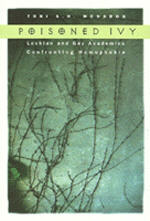 |


|
|
Poisoned Ivy: Lesbian and Gay Academics Confronting Homophobia by Toni A. H. McNaron, Temple University Press, 1997, paperback, $19.95
 Within the past decade, literature devoted to exploring crises and changes in higher education has developed into a cottage industry. One might read of the closing of the American mind, or the resultant calls to open that mind. One reads of "the university in ruin" and "forgotten promises," juxtaposed with "battling bias" and "building communities of difference."
Within the past decade, literature devoted to exploring crises and changes in higher education has developed into a cottage industry. One might read of the closing of the American mind, or the resultant calls to open that mind. One reads of "the university in ruin" and "forgotten promises," juxtaposed with "battling bias" and "building communities of difference."
Toni McNaron's Poisoned Ivy certainly stems from such works. It is not so much, in McNaron's intentions, a critique of post-secondary education, but rather an examination of the quality of personal and professional life of "established," (i.e., working as professors and/or administrators for more than 15 years) academicians who happen to be gay or lesbian. Poisoned Ivy is part memoir, part collection of survey data and life stories. The stories and data deal with being homosexual on campus, or, rather, trying not to be homosexual on campus. McNaron's focus upon older professors serves two purposes: to limit her survey and interview samples to those whom she feels would not have shared more recent, more liberating campus or professional experiences of younger "queers," and to help explain the meaning McNaron has found from her own experiences. Much of the book surrounds McNaron telling her own story about being a closeted professor at the University of Minnesota. She posits a particular goal in telling her own and others' stories: She hopes to let straight people know what it is like to be gay so that hopefully campuses will be made more welcome; she hopes to encourage closeted lesbians and gays to come out (p. 8).
Afraid of being denied tenure, gay and lesbian faculty are distant and aloof from colleagues and students. Once they receive tenure, they remain silent, fearful of being denied promotion, perks or benefits. Days are spent avoiding talk of personal activities, changing pronouns to conceal the gender of one's personal acquaintances, and alienating any other faculty whom one thinks might also be gay or lesbian. Nights are spent looking over one's shoulder, wondering who might be watching. Integration of sexual identity into personal and professional self-concepts and lives is key to ending this cycle, and instigating personal, institutional and political change, according to McNaron. While McNaron breaks no new ground with this data, she does provide evidence about the extent and validity of the stereotypes of gay academic lives of those who joined the professorate before 1980. Her data, the stories of men and women who have seen changes in social perspectives and liberties over just the past twenty-five years, are occasionally heartbreaking, often inspiring, and always the most interesting part of Poisoned Ivy. One irony of the book is that in taking personal risks, the author takes so few intellectual and methodological ones. The method for arriving at the interviews was relatively straightforward: she developed a snowball sample through advertisements that enabled 276 questionnaires to be returned out of 865. She then interviewed a representative sample of twenty faculty by phone or in-person. There were also follow-up questionnaires. The portrait of one's identity is also quite traditional. The more recent discussions and debates that are informed by postmodern analyzes of what it means to be "gay" or "straight" or "queer" are avoided, as are discussions about the fractured nature of identity and self. In many respects, except for the subject matter, this is a text that could have been written a generation ago, and herein lies the irony. Is Poisoned Ivy a book of inspiration, a guide to institutional change, a manifesto for coming out, a report on the state of the (queered) professorate? In part, it is all, and in whole, none. Poisoned Ivy is an interesting book, but it is not an enlightening one as we conclude the 20th century. We have learned such a great deal about method and theory that one might have hoped for a more rigorous investigation, and yet, the text is helpful, at times, insightful. The book certainly has inspirational and instructive components, and merely the writing of such a book may be welcomed as a marker that offers one particular take on who we are at a particular point in time. However, with a tighter focus on methodology or authorial intention, Poisoned Ivy might have been even stronger, rather than another additive to the scant literature about gays in higher education, or the extensive literature about curricular and campus climate changes. Nevertheless, the book is a good addition, and will provide a scaffolding for future studies of lesbian and gay academic lives. Reviewers: Patrick Dilley and William G. Tierney Patrick Dilley is a Ph.D. student in the School of Education at the University of Southern California, and William G. Tierney is professor of education and director of the Center for Higher Education Policy Analysis at the University of Southern California. Dr. Tierney's most recent book is Academic Outlaws: Queer Theory and Cultural Studies in the Academy. |
 © 1997-2000 BEI
© 1997-2000 BEI